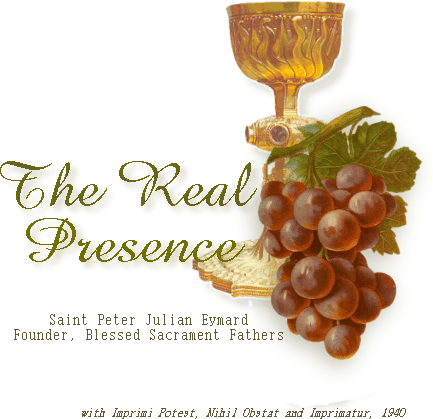

THE EUCHARIST AND THE GLORY OF GOD
Ego honorifico Patrem meum.
I honor My Father. (John viii. 49.)
OUR Lord did not want to remain on earth only through His grace, His truth or His words; He remains in person. We possess the same Lord Jesus Christ Who lived in Judea, although under a different form of life. He has put on a sacramental garment, but He does not cease being Jesus, the Son of God and the Son of Mary.
The glory of His Father which our Lord sought above all else on earth is still the object of all His desires in the Blessed Sacrament. It is safe to say that Jesus Christ has clothed Himself with the sacramental state in order to continue honoring and glorifying His Father.
I
BY HIS Incarnation the Divine Word repaired and restored the exterior glory of the Creator which was destroyed in the created world when man sinned through pride.
To perform this task the Word humbles Himself even to uniting Himself with our human nature: He came down into Mary and emptied Himself, taking the form of a slave.
After having paid man's ransom, given infinite glory to God by the actions of His life, and purified the world by His presence, He returned to Heaven in a glorified state; His work was done.
What a beautiful day for Heaven was the triumphant Ascension of our Savior!
But it was a sad one for earth which saw its King and Redeemer go away! Had it no reason to fear lest it might soon become a land hardly remembered by Heaven at first, then forgotten, and perhaps be the object of Divine wrath and vengeance?
It is true that Jesus left to man His Church with good and holy Apostles; but they were not the good Master. It is also true that there would be Saints who should imitate Jesus, their model; but, after all, they were only men like everybody else, weak, imperfect, and, as long as they lived, susceptible of serious sin.
Would not, therefore, the reparation of Jesus Christ and the glory He won for His Father by His sufferings and labors risk coming to nought if they were left in the hands of man?
Would not the work of the Redemption and of the glorification of God be too exposed to ruin if it were left in the hands of imperfect and inconstant man?
No, no! A kingdom conquered at the cost of unheard-of sacrifices, at the cost of the Incarnation and of the death of a God should not be abandoned thus.
The Divine law of love should not be neglected in this fashion.
II
WHAT was the Savior to do? He would remain on earth. He would persevere in His duties as Adorer and Glorifier of His Father. He would become the Sacrament of the glory of God.
Do you see Jesus on the altar? In the tabernacle? He is there; what does He do?
He adores His Father, gives Him thanks, and intercedes for man. He becomes a Victim of propitiation, a Victim of reparation for the outraged glory of God. He remains on His mystical Calvary, repeating His sublime prayer, "Father, forgive them! I offer Thee My Blood and My wounds for them!"
He multiplies His presence everywhere so as to be wherever there is anything to expiate. No matter where a Christian family takes up its residence, Jesus follows it to form with it a partnership of adoration, and to glorify His Father by adoring Him and by making Him adored in spirit and in truth.
God the Father, adequately satisfied and glorified, cries out: "My Name is great among the Gentiles, for from the rising of the sun to the going down, there is offered to Me an oblation of sweet savor!"
III
BUT, O wonder of the Eucharist! By His sacramental state Jesus offers to His Father a new homage, such as the Father has never received from any creature; a homage that is greater, so to speak, than anything the Word Incarnate could do on earth.
What is this extraordinary homage? It is the homage of the King of glory Who, with all the power and majesty of Heaven as His Own, nevertheless comes in His Sacrament to sacrifice to His Father not only His Divine glory, as in the Incarnation, but even His human glory, the glorified qualities of His risen humanity!
Unable in Heaven to honor His Father by the sacrifice of His glory, Jesus Christ comes down to earth again, is incarnated anew on the altar; and the Heavenly Father can once more contemplate Him as poor as at Bethlehem, although He remains King of Heaven and earth; as humble and obedient as at Nazareth; subject not only to the ignominy of the Cross but even to that of sacrilegious Communions; subject to His enemies, to those who profane Him; a meek Lamb that does not complain; a tender Victim that does not know how to complain; a good Savior that does not avenge Himself!
But why all this? I In order to glorify God His Father by the mystical continuation of the most sublime virtues; by the perpetual sacrifice of His freedom, of His power, and of His glory, which His love has bound in the Sacrament until the end of time.
Jesus Christ counterbalancing here below the pride of man with His humiliations, and giving infinite glory to His Father; what a pleasant sight for the love of God to look upon! Could the love of Jesus Christ for His Divine Father have a worthier motive for the Eucharistic Presence?
 Contact Us
Contact Us
HOME---------------THE HOLY EUCHARIST DIRECTORY-----------------------BLESSED SACRAMENT VISITS
www.catholictradition.org/Eucharist/real-presence16.htm